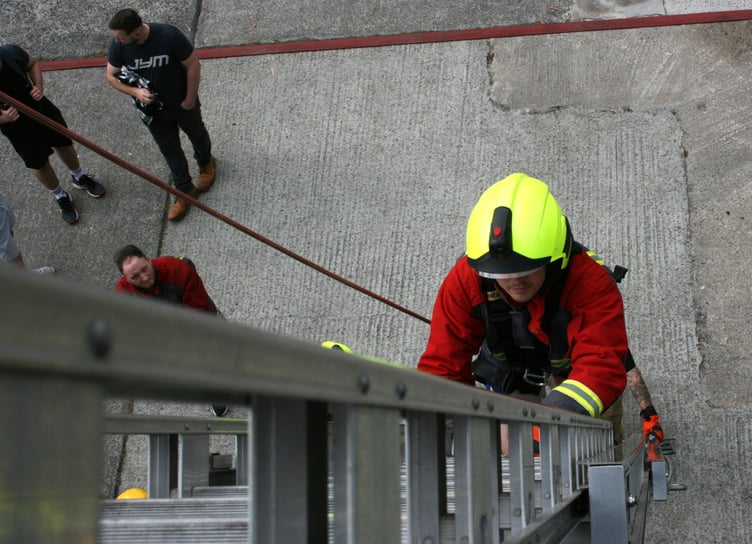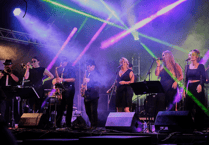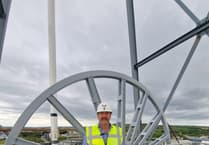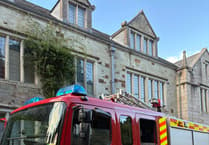Sunday morning, 9am. Most people are enjoying a lazy breakfast, possibly still in bed; but at Truro Fire Station, the turnout for Cornwall Fire and Rescue’s inaugural “Have a Go” session was impressive.
The event is part of the service’s first recruitment push since 2017, and it anticipates taking on a dozen new firefighters next year. Who knows: some of them might be in the room this morning.
Outside, current crew members are gearing up to give then a taste of the various facets of the job. There are shiny red engines to explore, but that’s not all.
A 13.5m ladder leans against a tower, for plucky would-be firefighters to climb; having reached the required height, they will be expected to lock in with one foot then lean back, hands-free, to describe something behind them. Elsewhere, rolled-up dummies and hoses are primed to be hoisted and hauled as if in a real-life burning building situation.
Firefighters John and Katie give us a rundown of the job – “it’s really varied – no two days are the same” - and explain what will happen if they get a call-out during the morning (in short, we will be shepherded out of the way so the engine can get going). Then we’re let loose.
Someone asks: “Who wants to do a bleep test?” I have no idea what that is, and figure the best way to find out is to volunteer. I regret this instantly when I discover it requires more energy than I ever have on a Sunday morning, or indeed at any time.
I find myself running a 20m course back and forth, trying to beat the bleep, in the company of two much fitter blokes with far longer legs. I bale out after two rounds; they keep going for another two. Firefighters must achieve eight. My lungs burn for the rest of the morning.
Next up, Mike Tremellen, an area manager based at HQ in Tolvaddon near Camborne, gives us some practice hoses and asks us to uncouple and recouple the ends – while wearing protective gloves. It’s fiddly, but less physical than some jobs.
“People think ‘I couldn’t be a firefighter - you have to be a massive strapping bloke with huge biceps’,” says Mike. “That’s absolutely not the case. This event is about dispelling that myth.”
At the knots workstation, I learn more about my fellow newbies. Jack, 22, works in the leisure industry in Newquay and is a keen climber, while Alex, 24, is from Camelford and is looking for a way to give something to the community after serving in the air force. Both seem unfazed by figure-of-eights and clove-hitches, unlike me.
Demonstrating how different knots have different strengths and therefore uses is Bodmin firefighter Luke Hodge, who has been in the service since 1998. Like all the firefighters on hand today, he’s only too pleased to share his passion for the job with those who might make up the next generation.
“Have a Go is quite new for us,” he adds. “It lets members of the public see what we’re all about. You can rock up, have some fun and a chat in a safe environment – I think it’s a great idea.
“There’s so much more to the job than just jumping into an engine. You might be going into schools to explain about fire prevention, or businesses to discuss smoke detectors.”
Round the corner, teams are kitting up in full uniform, including gas tanks and blacked-out masks, to get a feel for what it’s like to go into a burning building in search of casualties. Left hand on the shoulder in front, right hand keeping to the wall for bearings, left foot sweeping the floor; we take it in turns to lead and warn those behind about any obstacles we come across: furniture, walls, pillars. It’s disorientating, and would only be more so in the smoke, noise, heat – chaos – of a real house fire.
The key is communication and teamwork. This appeals to Karla Evans, who works for a funeral director in Liskeard but served in the police force for 14 years.
“In the police, we were often single-crewed and facing confrontation,” says Karla, 41. “We worked with the fire service regularly, and it seemed more about teamwork and dealing with situations proactively. I’ll definitely be applying.”
All this time, I have studiously avoided the ladder, being terrified of heights. I’m surprised to hear reassuring words from an unexpected source: Chief Fire Officer Kathryn Billing readily admits that at the beginning of her own active service, she didn’t like heights either.
“I was very nervous the first time I had to go up a ladder,” she says. “My station manager told me that despite all the years he’d done it, he was still nervous, too, which didn’t make me feel better.
“But climbing a ladder to pass a test is different to doing it on the job. Then, you’re thinking less about yourself and more about the people you’ve been called to help in their time of need.”
Kathryn’s entry into the fire service came in 2000 when she was working at a builders’ merchant and her boss heard an advert on local radio. Having practised her bleep tests in Morrisons car park in Pool, she joined first part-time, then whole-time - a 12-hour shift system, 42 hours a week, which is what this recruitment drive is particularly concerned with.
There are 31 stations in Cornwall, 24 of them staffed fully by on-call firefighters who fit it around day jobs. “If it weren’t for these incredible people, we wouldn’t have a fire service in Cornwall at all,” says Kathryn.
The job is quite different today. “Fires are reducing, but we also attend road accidents, mental health and safeguarding incidents. We spend a lot of time talking to people, and collaborating with other emergency services. Yes, you need to be fit and strong, but you also need empathy and compassion.”
A lot of the things we’ve done, you can work on at home – Luke recommends a YouTube tutorial for knot-tying practice, and there are bleep test apps you can download.
The day ends with a wrap-up chat, with opportunities for questions and information about forthcoming open days and how to apply.
Diversity is key – women, BAME, LGBT+, all are welcome to apply. “Nationally, we struggle to engage with some of the minority groups, and we’d like to see them reflected in the service,” says Mike. “Everyone has the potential to have a fire, after all.” Kathryn quotes the Cornish motto: “One and All.”
There is also a helpful reminder that you don’t have to be on the frontline – you could equally do your bit in an admin or supporting role. That certainly sounds more like me.
Future sessions will take place on:
• Saturday, August 31: Falmouth Community Fire Station, 9am to 11am • Saturday, September 7: Bodmin Community Fire Station: 9am to 11am
These are fully booked but a waiting list is in operation. Wear comfortable clothing, such as activewear and trainers.
Online sessions will take place on:
• Tuesday, August 27, 7.30pm to 8.30pm • Saturday, September 14, 5pm to 6pm
Attendance is unlimited but participants must register in advance.
Visit www.cornwall.gov.uk/fire-and-rescue-service/service-careers/have-a-go-events/




.jpeg?width=209&height=140&crop=209:145,smart&quality=75)
Comments
This article has no comments yet. Be the first to leave a comment.